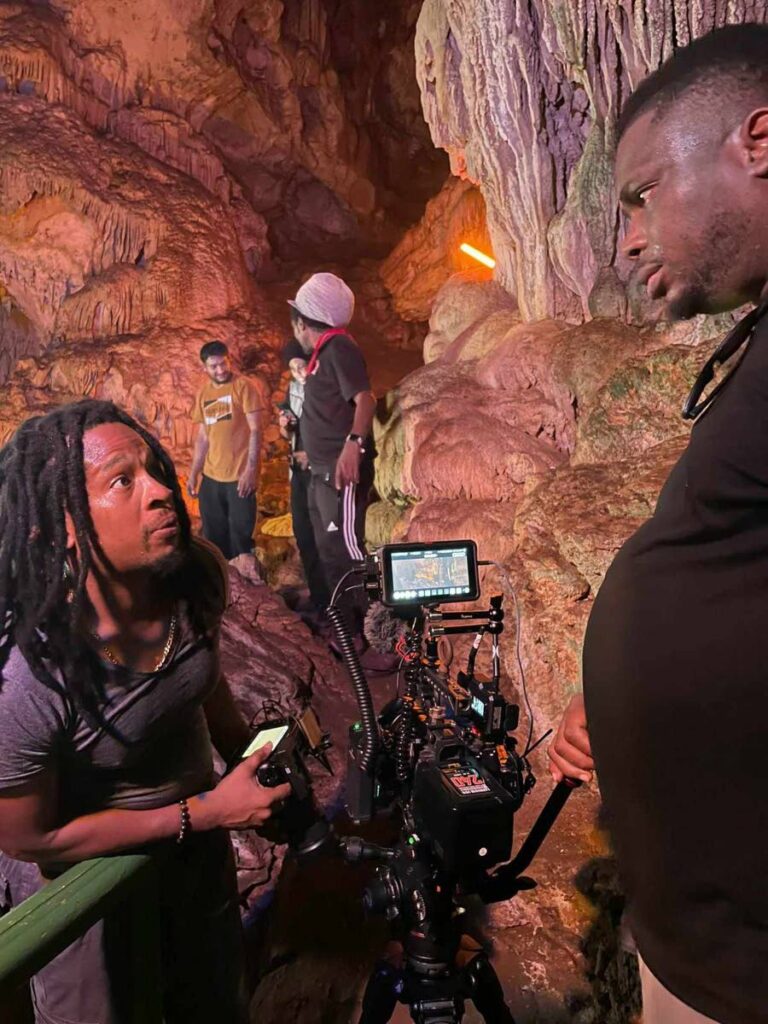Nigerian filmmaker James Amuta wants to bridge gap between Caribbean, African film industry

Nigerian filmmaker James Amuta is impressed by Trinidad and Tobago as well as the talent of its people and hopes his work here would help build a bridge between Nollywood and the local film industry.
The writer, director, producer and cinematographer recently facilitated the third cohort of FilmTT’s Business of Film: Script to Screen Programme, and shot a teaser film for a screenplay he wrote, called When The Monsters Come Out, for the workshop.
Author of Enigma: Beyond the Poet, a collection of 84 poems published in 2007, Amuta started actively making films and TV shows in 2008 and is known for his “guerrilla-style” filmmaking.
“It’s basically when you have the goal to make an incredible film but you don’t have the means to do so. You have to adopt techniques, think outside the box and use unorthodox strategies to achieve the same result.”
He described the style as irregular and more effective. He said the style usually involved smaller crews, people performing multiple functions and building gear which makes participants more creative. He said as long as filmmakers have their brain, vision, and a team, they had no excuse and should just get it done.
He intentionally shot When The Monsters Come Out using the guerrilla style to demonstrate to the 33 participants of the workshop how it is done. He gave them hands-on training on how to utilise resources, network, and how turn around a film in a short timeline.
The workshop began on May 17 via Zoom and it produced over 35 short films and 28 scripts. Shooting took place from July 21-23 at Gasparee Caves, Down The Islands, and in Cocorite.
Amuta said because TT is close to the US people might believe the film industries are similar but they are not.

“A lot of the filmmakers are passionate, we want to make films but, at the same time, we don't have the resources to make the films. So why I'm here is to tell them as long as you have the story, you have your brain and you have the team, once you have that vision, you can actually make the film with whatever you have.”
He said when he saw how talented, passionate and driven the students were, he decided to raise the stakes and challenged them to create a trailer film with international potential, worthy of being shown at various film festivals. He intends to carry it to a number of international film festivals, including those in Africa, to see if he could get funding to create a full-length film.
Danielle Nivet, FilmTT facilitation officer, explained Amuta’s involvement came out of a 2022 mission to Nigeria, orchestrated by Lanniup Consulting, when a TT delegation went to Lagos to make a film connection.
The mission included Sean Valley of Lanniup Consultancy, FilmTT general manager Leslie Ann Wills-Caton, C15 Studios general manager Lorraine O’Connor, and TTT Television programming manager Diane Robertson.
“We're trying to push TT as a film friendly destination where persons can come and enjoy what we have to offer and use what we have. We're trying to up-skill our film industry. This is actually the third cohort of the capacity development programme and (this time) we're looking at guerilla filmmaking and looking at the action genre.”

Amuta said the goal was to create a bridge connecting the Caribbean with the African film industry and provide a platform to expose TT talent in Nollywood.
“We share a common ancestry of West Africa and this is how we are embracing our cousins and understanding that we use our big brother status to pull our cousins along and give the talented people here that platform to be on this co-production. We look the same, we sound the same, why can’t we be in the same films?”
He added that he was in TT to show the people of Africa the beautiful islands and people of TT and that it is a film-friendly destination. He also suggested the governments and airlines should arrange for at least one direct flight per week from Port of Spain to Lagos, Nigeria.
Amuta encouraged local filmmakers to keep creating and improving their skills even if the result may not be perfect.
He said it may be difficult but people need to start with what they have, even if it is a smart phone. He also advised filmmakers to train themselves in all steps of the filmmaking process and become be self-sufficient.
“The production values (of TT films) might not be there yet but I liked it. I liked the fact that people can go out and do grungy films. Just do it and get better at it. You don't sit down and wait until you're perfect before you go out and make the film. You don't sit down and wait until someone hands you a bag full of cash before you go out and make the film.”
He said there was a time when Nollywood was mocked and laughed at but now people invest in it and its movies have become international successes.
“Just make anything, don't expect it to be perfect from day one. That's what Nollywood did. Through the early works, you had a lot of all sorts – the good ones, the bad ones, the downright terrible, the ones that will make you want to pull your hair out. But they kept doing it and they kept getting better. And they built a fan base, even the terrible ones have a strong fan base. People just wanted the story.”
Nigerian filmmakers then started going abroad for training, filmmakers got better, became bolder, wrote more solid stories and, while it took decades, the world noticed, became curious and started investing.
He likened it to going out on the street and begging for water. He said people would say you are lazy and ignore you but if you have on a track suit and start running, someone would think you are training for something and give you water.
Eventually, running everyday, people will get curious and ask why. One day, someone would suggest you wear their T-shirt so people could see their brand and you run pass. Someone else may see that and sponsor the entrance fee to a race or flight to a marathon abroad, and so your career may expand.
“Now people are supporting you because they see you putting in the work.”
Amuta told Newsday he spoke from experience. As a storyteller, he learned how to do everything in the filmmaking process so he could be self-sufficient or step into any role in case of an emergency.
He has made TV series, infomercials, short documentaries, feature films. He has produced six major films including the Netflix original film Oloture, wrote and produced Collision Course which is streaming on Netflix, and co-produced Elesin Oba: The King's Horseman, a Netflix film adaptation of Wole Soyinka's Death and the Kings Horseman.
He wrote, produced, directed and shot the feature film Black Harvest; the documentary Nightfall in Lagos, which won the Best Documentary by an African award at the Toronto International Nollywood Film Festival and was nominated for the best documentary film in 2018 by the Africa Magic Viewers' Choice Award; the documentary Genius in Disguise, and more.
He stressed that he was no better than his TT students, he just came from a bigger territory and had more opportunities.

Comments
"Nigerian filmmaker James Amuta wants to bridge gap between Caribbean, African film industry"